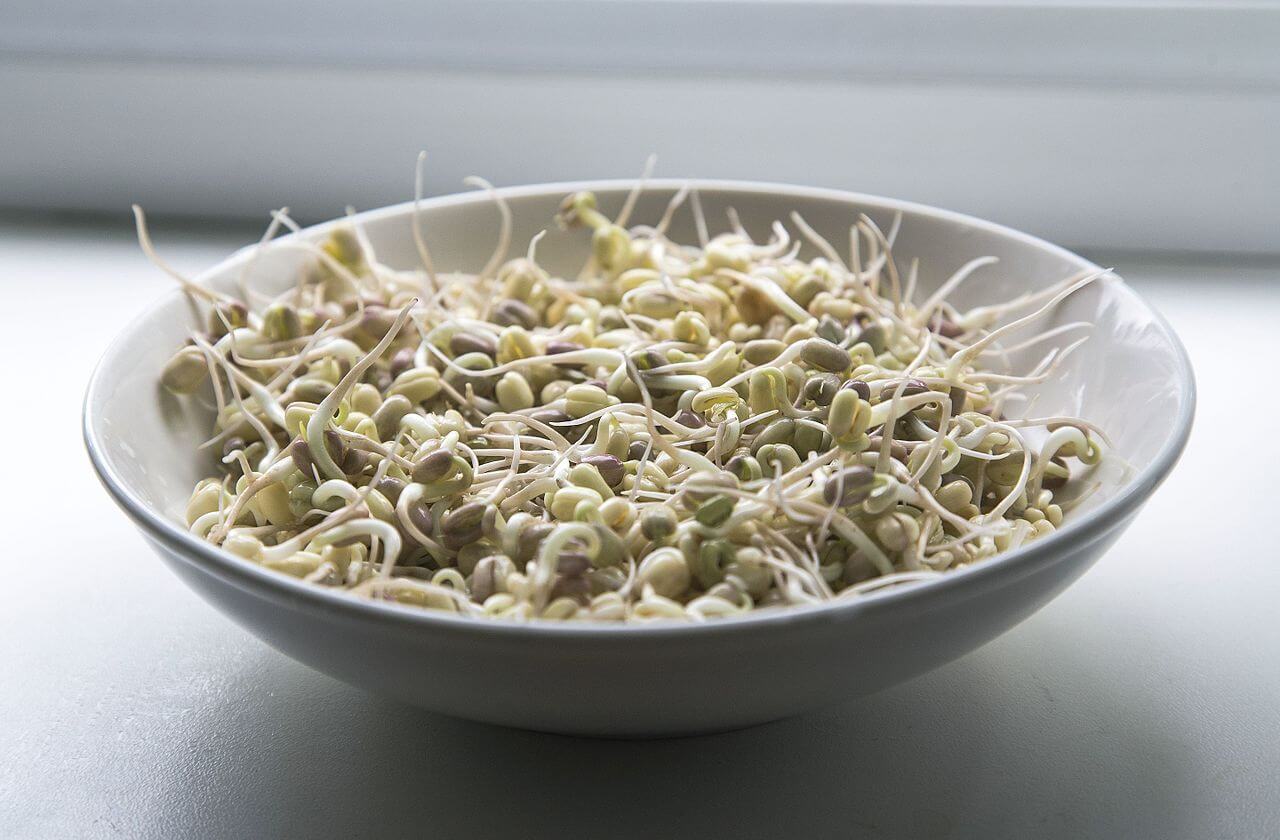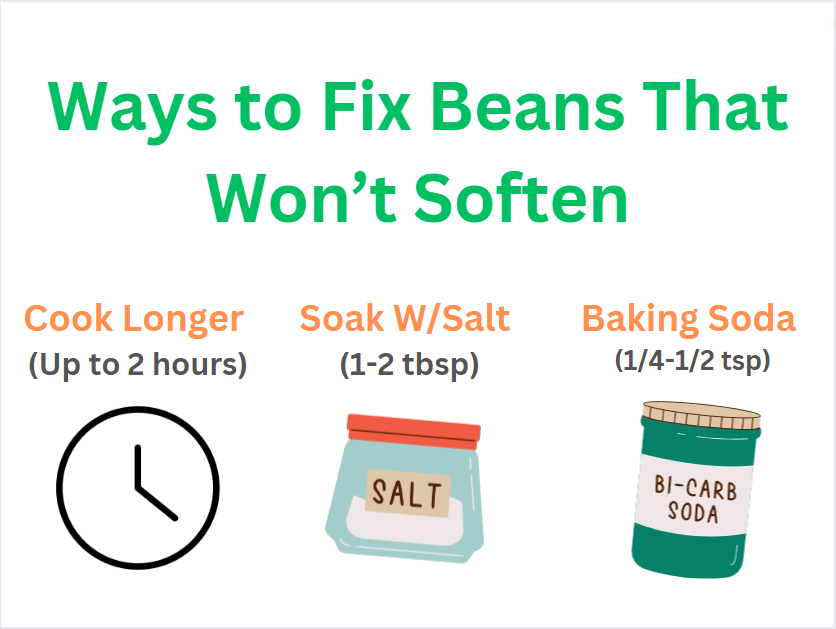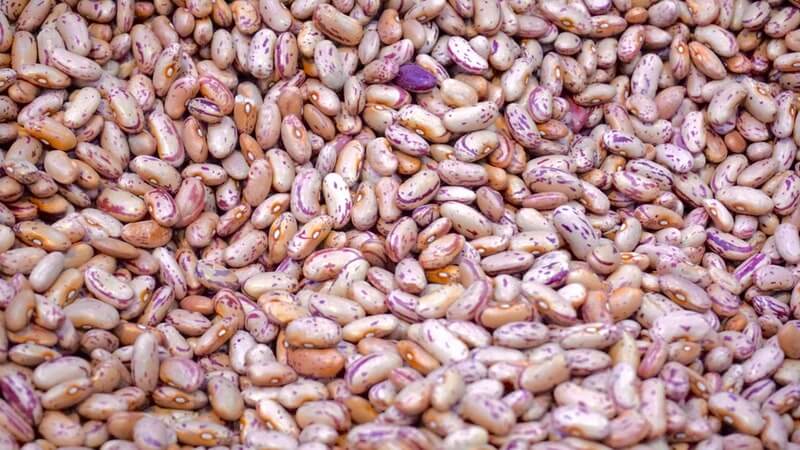One day I was cooking beans for over an hour, and they still wouldn’t soften…
This led me to start learning about why this happens and experimenting to find the best solution.
It turns out there are 4 main reasons that legumes (any type) stay hard while you cook them, and the solution can be as simple as adding some baking soda, or cooking longer depending on the specific cause.
Table of Contents
Why Your Beans Won’t Soften
There are a few main reasons that beans stay hard while cooking them:
1. Your Beans Are Too Old
Dried beans can be stored without problems for years if you store them correctly.
This means in a dry, dark place, and most importantly – in an air-tight container or bag.
If you just opened a bag and they won’t soften, this is probably not the issue (unless it’s super old).
At the very least, soak really old dried beans longer (12-16 hours instead of 8-12).
2. You’ve Added an Acid Too Soon

The most common mistakes people make when making recipes like chili with dried beans is adding the tomato ingredients too soon.
The acid prevents the beans from soften (It can prevent other foods like potatoes from softening as well).
Instead, you need to cook the beans first, essentially to completion, and then add the tomato sauce.
This goes for any acidic ingredient:
- Tomatoes
- Lemon juice
- Vinegar
- Some molasses
3. You Have Hard Water or Chlorinated Water
Hard water (not the same as chlorinated water) can make softening more difficult, but it depends on specifics.
Beans will soften in some hard water, but not in other hard water.
If you’re worried about this, you’ll need to use filtered water of some kind.
Alternatively, some cities add a lot of chlorine to their water, and this can cause all sorts of problems when cooking beans (and even making bread).
You can let the water sit in your pot overnight to let the chlorine evaporate, or give it a quick boil to speed up the process.
4. You Didn’t Soak Your Dried Beans

Dried beans need to be soaked before cooking them (it’s still possible if you don’t, but much harder).
Soak them in warm water for at least 12 hours before cooking them. This makes them soften much easier.
How To Fix Legumes That Won’t Soften

Just because your beans aren’t in ideal shape doesn’t mean that all is lost.
You can still cook them as usual in most cases, you’ll just have to cook them for much longer (2-3 hours in some cases).
There are a few other things you can try:
- Add salt to your soaking water – Add 1-2 tablespoons of salt when you soak your dried beans overnight. The salt essentially allows the starch in the beans to absorb water more effectively (1).
- Add baking soda – While cooking your beans, add 1/4-1/2 teaspoons of baking soda to encourage softening. Careful though, if you do this when they are near cooked, they may become mushy.
- Use a pressure cooker – Pressure cookers are magic when it comes to beans, don’t ask me why.
If none of those work, your beans will have to head to the compost. The good news is that new beans are cheap, so it won’t hurt your wallet too much.
Don’t Add Too Much Baking Soda
Adding baking soda while your beans cook works quite reliably, but it’s not the magic fix that it may appear to be.
There are 2 main side effects:
- It makes legumes mushier – While we want softer beans, there’s a difference between soft and mushy. You don’t want to lose all the bean texture in most cases.
- It affects the taste of the beans – In small amounts you probably won’t notice the baking soda, but if you add too much (as I have before), you definitely notice the taste and it’s not great.
Just be mindful of how much you add, and add it in small amounts so that you can use the minimum possible.
Adding a bit of extra acid (e.g. lemon juice, vinegar) can help balance out both the pH and taste of your food after adding baking soda.
Beans That Are Still Hard After Cooking For a Long Time
If you’ve cooked your beans for hours and they are still hard, you’re out of luck.
Your last resort is to add baking soda, as described above.
Add 1/4-1/2 teaspoons of baking soda to encourage softening and give your beans another 30-60 minutes to cook while simmering (your liquid should be hot, but not rapidly boiling).
Do Dry Beans Go Bad?

Short answer: Yes, dry beans go bad, it just takes a long time.
Longer answer…If you’re storing beans in a reasonable location (dry, sealed off), dry beans are unlikely to get moldy, even after years. It is possible, so check for any weird looking beans before cooking them.
The issue is that over time, dried beans become harder to cook.
The older dry beans are, the longer they take to cook. Some have guessed that they lose their ability to soak up water. If your beans are too old when you cook them, they won’t soften much and will have an unpleasant texture.
So while eating dried beans that are a few years old is perfectly safe in most cases, they probably won’t taste as good. Ideally, try to eat them within a year at the latest.
How Do You Know if Dried Beans Are Too Old?
The most obvious sign is mold. You’ll see it, and likely smell it right away.
The other sign would be that they don’t expand as expected when you soak them. If you’ve soaked them for 12-24 hours and they still aren’t fully hydrated, the beans are “too old” and should be thrown away.
It’s a shame, but at least dried beans are cheap to replace.
